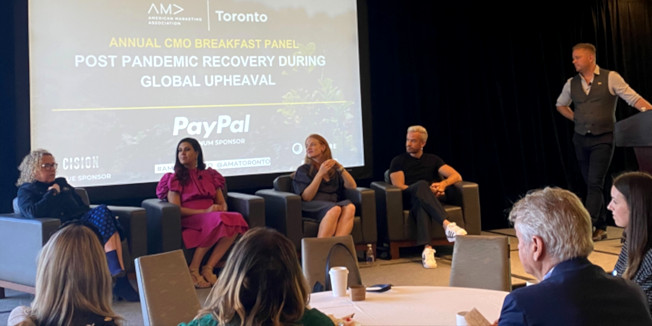The American Marketing Association Toronto Chapter (AMA Toronto) recently held its annual CMO breakfast panel to discuss the post-pandemic marketing landscape. Topics were explored, insights were uncovered, and coffee was savored. Here are our top four takeaways.
-
Consider dividing your short-term and long-term marketing mandates and goals
There’s a lot to balance in any organization, especially in regard to marketing functions. Fatima Israel of EY Canada explained the benefit of having two distinct teams under the marketing umbrella, each with its own unique mandate. For some organizations, that could mean one team focusing on campaign performance and demand generation while the other works towards longer-term mandates that drive brand perception, such as employer branding, corporate responsibility, and diversity, equity, and inclusion (DEI).
-
Ecommerce is part of the entire customer journey, not a separate function
The pandemic dramatically accelerated demand for ecommerce and curbside pickup. For those considering expanding their businesses into the ecommerce space, Alison Lawler-Dean, VP of Marketing at Indigo, had a key piece of advice: “Treat it as an extension of your business.” Adam Jardine, CMO of Kijiji Canada, emphasized that “the right analytics need to be in place” before you start.
Although consumers have now largely returned to brick-and-mortar locations, the public’s mass adoption of ecommerce is here to stay. As a result, shopping habits have changed forever—and forward-thinking marketers are finally beginning to unlock omnichannel’s epic potential. So, how exactly do you create seamless online-to-offline experiences? Our exclusive omnichannel study reveals all.
-
Use the “Great Resignation” to acquire incredible talent and articulate your purpose
Considering the “Great Resignation” to be a bit of a misnomer, most panelists instead chose to look at recent recruitment upheaval in a more optimistic light. Referring to it as a “reshuffle”, Tracey Cooke, Nestle Canada’s SVP of Marketing & Communications, explained how her organization has gained incredible talent over the past few years.
Jardine, meanwhile, spoke about the rising cost of talent acquisition and retention, with Craig Lund, AMA Toronto’s VP of Mentorship, in full agreement. The latter’s assertion that talent costs are rising for the first time in over a decade may even suggest that the Great Resignation is an inevitable and long-overdue remedy to an imbalanced job market.
Whether you see the Great Resignation as a threat or an opportunity (or a bit of both), it’s clear that potential recruits are now more mindful of their worth. They’re also more discerning about their suitors, and are demanding to know which causes and purposes a potential employer stands for. But don’t just take our word for it: dive into our fascinating chat with Talentfoot founder and CEO Camille Fetter.
-
Privacy is changing—and your competitors are already gearing up
The panelists didn’t flinch when the topic of privacy inevitably came up. Why? Because most are already preparing for the imminent demise of third-party cookies and the rising importance of first-party data. All panelists agreed that they need to take data protection extremely seriously as they seek to build trust with their audiences. In highly regulated environments—such as Canada, where both CASL and GDPR rules apply—the right customer data management (CDM) tools need to be in place at every stage of the customer journey.
As we continue to adjust to our new normal, it was great to once again network with our peers in person. The collective insights, ideas, and optimism didn’t only energize all in attendance, but point to a bright future for marketers in the post-pandemic landscape.





